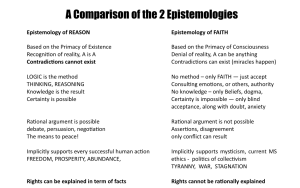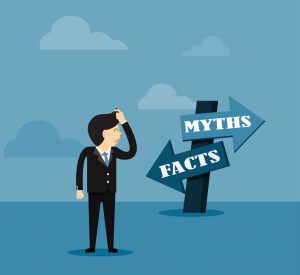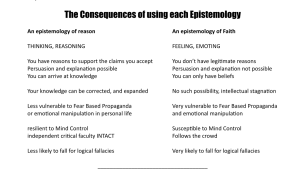Podcast: Play in new window | Download (Duration: 49:24 — 56.5MB)

We all need a means to validate what we claim as our knowledge. We need to know how to know things, how to achieve certainty that the ideas we hold and act on, are valid and true. We don’t have automatic knowledge, but we require knowledge in order to act successfully. Hence our need for a means of validating any and all information we hear, and the ideas we generate ourselves, so we can proceed to do things with confidence of success.
An epistemology is a fundamental set of ideas that form the basis of your thinking, your method of knowledge validation. The method you use to discern what is real and what is not, must be grounded in the correct epistemology. Otherwise, in the long run, only failure and suffering can result.
Explicit versus implicit
The first point to note is that we all use an epistemology, even if we haven’t heard of the word. But our epistemology remains implicit, unless it is specifically stated in terms of the fundamentals of one’s thinking — which of course, it isn’t.
Implicit, in this context, means that it is necessarily a part of the mental process, even if it is not consciously recognised, or verbalised.
Two Epistemologies
In the broadest sense, and for all practical purposes in validating information, there are only two epistemologies: one that is correct, based on reason and logic, and another that is incorrect and based on faith, or more fundamentally, emotions. I use the term ‘correct’ here, assuming that successful action, staying in touch with reality, and the achievement of one’s goals is always the desired outcome. The correct epistemology is rooted in the acceptance of an objective reality that is knowable, the incorrect one is not.
[I must add here, that Epistemology is a very wide and comprehensive subject. In this context I am not talking about concept formation, the structure of reasoning, or other sub topics within epistemology. I am referring only to the essential principles (or lack of them) at the base of the concept of knowledge that distinguishes the essence of the only two basic approaches.]
For the purpose of illustration here, I shall refer to the correct one as the epistemology of reason, and the incorrect one as, the epistemology of faith, and I will show you why one is correct, and the other is not.
Philosophical Bedrock
To begin with, these two opposing epistemologies come directly from two corresponding opposing views of the nature of reality. Now we’re getting into metaphysics – the most fundamental branch of philosophy. And the basic issue is this: Either reality is real and exists independently of any consciousness, or it isn’t, and it doesn’t.
The important point to note is that if one adopts, and holds as true, certain ideas, such as consciousness creates reality; the hermetic principle that “all is mind”, then one is, to that extent, implicitly using the wrong epistemology. (as I shall demonstrate)
Lets look at these two views of the nature of reality, and see how they lead to opposing views of the nature of knowledge and the ability of the human mind to know reality.
The first, I shall refer to as the primacy of existence. According to this view:
 That which exists, the world, reality, existence, is what it is independent of the content of any consciousness. Facts, existence, have metaphysical primacy, they come first, they set the terms, they are there, they are real, they are independent of any mind or consciousness. Reality is an objective absolute, and consciousness (according to this view) is merely the faculty of grasping what is out there, what antecedently and independently exists. Consciousness is simply the faculty of perceiving, grasping, identifying, coming to discover what is out there.
That which exists, the world, reality, existence, is what it is independent of the content of any consciousness. Facts, existence, have metaphysical primacy, they come first, they set the terms, they are there, they are real, they are independent of any mind or consciousness. Reality is an objective absolute, and consciousness (according to this view) is merely the faculty of grasping what is out there, what antecedently and independently exists. Consciousness is simply the faculty of perceiving, grasping, identifying, coming to discover what is out there.
The alternative view, I shall refer to as the primacy of consciousness. According to this:
Existence is a by-product, a creation, a derivative of consciousness. Facts are not independent of people’s beliefs, wishes, hopes, dreams, aspirations, etc, but facts are in some way created by or derivative of these mental phenomena. So that If someone believes something, the act of believing it would require that the corresponding fact come into existence. According to this view, consciousness sets the metaphysical terms, it comes first, it is the primary and existence snaps into line accordingly.
These two views exhaust the possibilities, and they are mutually exclusive – its either one or the other.
There are 3 important points to note here:
1) If the primacy of consciousness were true, there would be no need for a system of validation. The thought would create the fact.
2) The two opposing epistemologies arise directly from these two opposing and mutually exclusive views of the nature of reality.
3) Mainstream philosophy, was hijacked and corrupted long, long ago — way before the mainstream media was consolidated into a handful of controlled corporations, before the medical establishment was taken over, way before the extensive unseen influence over of most of western culture. And, modern philosophy advocates that consciousness creates reality, that reality is unknowable, and that the mind is impotent. In a nut shell modern mainstream philosophy is totally on board with the wrong epistemology. And this is why so many people have been influenced to follow suit.
 All you serious truth seekers out there, will already be aware that the truth is not found in the mainstream narrative, on your 6 O’clock news, or in the newspaper. And I hope, therefore, you will give my argument serious attention. Also, bear in mind that most people are not aware of philosophy or epistemology on any level, and are therefore not going to be questioning it, but accepting and swallowing whole any and all philosophical ideas to which they are exposed. And we are all exposed to them all the time.
All you serious truth seekers out there, will already be aware that the truth is not found in the mainstream narrative, on your 6 O’clock news, or in the newspaper. And I hope, therefore, you will give my argument serious attention. Also, bear in mind that most people are not aware of philosophy or epistemology on any level, and are therefore not going to be questioning it, but accepting and swallowing whole any and all philosophical ideas to which they are exposed. And we are all exposed to them all the time.
The bulk of mainstream ideas promoted in our culture — in films, books, songs, think tanks, NGOs and government policies — promote ideas that implicitly rest on epistemology of faith – including the idea of collectivism. Right across the board, the view that reality is an objective absolute is undermined. The only exceptions are things like the manufacturing industries and other areas where dealing with reality is inescapable, and only the correct epistemology of reason will work. Road building, creating infrastructure, etc.
So, let’s make a direct comparison between these two epistemologies. That of reason, and that of faith.

Notice that these two epistemologies are opposites. They cannot both be correct. And one cannot be correct for some areas of human concern, and the other be correct for a different set of human concerns. If you want to know the truth, you must use the correct epistemological basis for all of your thinking, whatever the subject matter.
The correct epistemology has a guiding principle (the law of non contradiction) and a method of logic, the other has neither. This is why the correct epistemology has to be used to understand reality, and know how to act successfully. The incorrect epistemology has to be used in order to believe in anything for which there is no explanation using the correct Epistemology. In other words, the wrong epistemology has to be used to justify the unjustifiable, or to accept an idea in the absence of any logical reasons, proof or evidence, and even in contradiction to available facts, proof and evidence.
 In accordance with the correct epistemology one looks for evidence and facts, under the guidance of the wrong epistemology one simply accepts claims without either. The correct Epistemology looks for logical reasons and achieves understanding, the incorrect one doesn’t look for logical reasons, and therefore cannot achieve understanding or anything that can be called genuine knowledge.
In accordance with the correct epistemology one looks for evidence and facts, under the guidance of the wrong epistemology one simply accepts claims without either. The correct Epistemology looks for logical reasons and achieves understanding, the incorrect one doesn’t look for logical reasons, and therefore cannot achieve understanding or anything that can be called genuine knowledge.
It’s also very important to grasp that the primacy of existence is an axiom. It is the abstract conceptual expression of what is self evident. Things are what they are, independent of any consciousness wishing the contrary. Being axiomatic, no proof of it is either required, or possible. The primacy of existence is the foundation of the concept of proof. The acceptance of this axiom is the presupposition of any rational discussion.
To emphasise that the primacy of existence is self-evidently the way things are. Consider that everything we do all day long (as we act out our lives) is based on the implicit assumption that reality is real and exists, and that things are what they are. Consider driving along a road. Everyone of sound mind accepts that one must conform to the road, not that the road will conform to one’s wishes or one’s thoughts. Notice that In the law courts, the recognition and acceptance of reality as an objective absolute is recognised as the basis of proof and used to determine matters of truth or falsity. If you simply want to make a meal, build a shelter, or do anything to achieve any result, you will be assuming (implicitly, even if you don’t consciously think about it, or talk about it) that reality is real and independent of your consciousness. In other words, you will be implicitly recognising reality to be an objective absolute. You will be implicitly recognising the primacy of existence by your actions, every one of them, all day long.
The Epistemology of reason is based on this recognition of reality as being real and objective. The epistemology of faith, on the other hand, ignores or denies reality and permits any assertions or claims to be accepted without facts, proof or evidence. It allows any sacred text to be believed on the basis of it being the word of a supreme being. It allows the word of the commander in chief, in whatever context, to be accepted without question.
Using the Wrong Epistemology Can Become a Habit
Most of the time as we go about our daily lives, interacting with the world around us, we use the correct epistemology—we have too, because its the only one that works. Our faculty of reason using the method of logic in the process of thinking is our basic means of living, and constitutes the correct epistemology. However, almost all of us drift into using the incorrect epistemology some of the time, particularly when we consider or discuss things like the nature of reality, spiritual matters, or the subject of morality. This is due to the fact that many ideas promulgated in our surrounding culture implicitly rest on the wrong epistemology. Unquestioning acceptance of such ideas necessitates implicit acceptance of the epistemology of faith. The epistemological method is smuggled in together with the idea. The more ideas one uncritically adopts that are based on the implicit epistemology of faith, the more accustomed to it one becomes.
When you also consider that we are culturally encouraged to value our feelings over our rational faculty, it is unsurprising that so many people first reach for how they feel about something rather than what they think about it. For example, political correctness in general, and specifically, the compulsory recognition of scores of new genders, are both concessions to feelings over facts.
To illustrate our use of these two epistemologies lets look at some examples:
If you wanted to know how to learn cookery, or motor mechanics, or how to sail a yacht, you would very likely go on a course, or in some way study the facts of how to learn that particular skill. Under the implicit assumption that the course is offering you true guidance, you would use your rational faculty to assimilate the knowledge into your mental map of reality. You would implicitly be using the epistemology of reason, and you would be dealing with, and concerned with, facts.
If you demand evidence or proof that a new medical treatment is safe and effective, or evidence that fluoride in water is genuinely good for your teeth, you would be implicitly using the epistemology of reason. If you do research for a project at school or college, or if you research any subject of interest you would generally be using the epistemology of reason.
On the other hand, if you defend the idea of self-sacrifice as good, or if you claim that we are all one, if you believe in a supernatural deity, or in reincarnation, etc, you are now implicitly using the opposite, incorrect epistemology — the one NOT based on facts, evidence, proof.
The negative consequences for human freedom of using the wrong epistemology
 There are many negative consequences of using the wrong epistemology. Perhaps the most serious is, in terms of the implications for our political freedom.
There are many negative consequences of using the wrong epistemology. Perhaps the most serious is, in terms of the implications for our political freedom.
One cannot take a credible stand for freedom if one is in the habit of relying on the epistemology of faith. You have to reason for freedom, you cant simply demand it, or say that you feel you need it. one must stand explicitly and consistently on the metaphysics of an objective reality and explicitly and deliberately use the epistemology of reason to defend or argue for freedom.
The danger to our political freedom begins with the acceptance of some mystical ideas, or religion, and various associated dogma, many of which lead to, or support, the acceptance of the morality of altruism. Altruism cannot be supported by any facts of reality, because there are none that support it. It must be accepted on faith. It holds that self-sacrificial service to others is the standard of good, and that man has no right to live for his own sake, that the only justification for his existence is the service of others, the community, or the collective, as a moral duty. It is the morality of slavery.
Let’s bear in mind that freedom is a political concept, and remind ourselves that every system of politics comes out of (and is based upon) a system of ethics (morality). Ethics directly effects politics because the question of how men should act individually necessarily precedes and informs the question of how they should act with respect to one another in a social context.
Unless you consistently and deliberately use the epistemology of reason how will you argue against altruism and the code of self-sacrifice – the ethical basis and moral justification of political collectivism?
Unless you consistently use the epistemology of reason how will you discuss rights as a moral concept derived from the facts of reality and the facts of man’s nature as a being with a volitional, conceptual consciousness?
How will you argue for the right to live for your own sake, retain your own private property, and to be left alone in peace to act on the basis of your own judgment? How will you argue for this without reference to the objective facts of reality and of mans nature? The answer is you can’t.
Our political adversaries will only ever assert their lies and false justifications for political control. It is only reasoning and logical questioning that can cut through their propaganda and give the lie to their false ideas. It is only on the basis of A is A that you can expose contradictions as red flags of logical error, and therefore expose lies.
Mysticism, revelations, just knowing, or following your feelings will not help you to escape the tyranny of totalitarian government. Only reason can offer an argument for freedom.
Unless we truth seekers consistently use the correct epistemology, and not habitually flip between the two as we entertain fanciful ideas, or to justify the unjustifiable — such as the existence of supernatural sky daddy — we will inadvertently relinquish the rational standard that is necessary to argue for freedom.
 But there are more negative consequences which derive from the fact that using the epistemology of reason in the process of thinking is hard work, and discerning truth takes effort. Consulting one’s feelings, on the other hand, is much easier. PLUS we have all been encouraged to follow our hearts not our heads by mainstream culture for many decades. So there is a subconscious temptation to slip into the habit of using the short cut (wrong) epistemology, and predominantly listen to our feelings, implicitly taking them as guidance to action, instead of doing the mental work of reasoning and weighing evidence and arguments, based on the epistemology of reason. This reliance on emotions causes several negative consequences, both personal and social. The following comparison of consequences may help to illustrate this.
But there are more negative consequences which derive from the fact that using the epistemology of reason in the process of thinking is hard work, and discerning truth takes effort. Consulting one’s feelings, on the other hand, is much easier. PLUS we have all been encouraged to follow our hearts not our heads by mainstream culture for many decades. So there is a subconscious temptation to slip into the habit of using the short cut (wrong) epistemology, and predominantly listen to our feelings, implicitly taking them as guidance to action, instead of doing the mental work of reasoning and weighing evidence and arguments, based on the epistemology of reason. This reliance on emotions causes several negative consequences, both personal and social. The following comparison of consequences may help to illustrate this.

How to avoid using the wrong epistemology
 The bottom line is that its not OK to mix your epistemologies! Its mixed-up thinking, Its self-contradictory. And anyone serious about discerning truth, knowing what is real, and becoming a credible thinker, must get their mental files in order. This means identifying your premises, correcting them where necessary, and making them explicit in your thinking.
The bottom line is that its not OK to mix your epistemologies! Its mixed-up thinking, Its self-contradictory. And anyone serious about discerning truth, knowing what is real, and becoming a credible thinker, must get their mental files in order. This means identifying your premises, correcting them where necessary, and making them explicit in your thinking.
– Make the connection between ideas you consider or believe to be true, and the fundamental premises on which they rest. And make the premise explicit in your thinking — be aware of the epistemology underpinning what you chose to believe.
– Make a point of committing to the epistemology of reason, and then strive to use it consistently, whatever the subject matter — whether the existence of God or the existence of genuine reasons for lock downs and face masks.
– Create the habit of always thinking, and asking why, demanding reasons, rather than relying on feelings.
– Make sure you can explain your convictions. If you can’t you don’t understand them yourself.
Assuming that you are convinced by the case I have presented, be conscious of the correct epistemology in all your thinking. This may require that, initially, you consciously remind yourself that A is A, existence is identity, everything that exists is something specific of a certain nature, and of certain kind. Remind yourself that reality is an objective absolute, and that any idea that implicitly contradicts this fundamental, must be wrong, untrue, incorrect, false.
Remind yourself that your number one golden rule is that contradictions don’t exist. Resolve them by investigating to find out the reason behind each contradictory claim. Then weigh the logical strength of each argument, and throw out the one with the weakest argument or non-argument. This is how you discern the truth.
It will, of course, be necessary to reject any ideas that you hold on faith — as opposed to, for solid, logical reasons. This includes rejecting the idea of a supernatural sky daddy, reincarnation, unconditional love, altruism, we are all one, etc. You have to reject all mysticism, because it is the negation of the correct epistemology.
Summary:
2 methods of knowledge validation. Only one is genuine – the epistemology of reason.
Become conscious of both of these epistemologies, and be aware which one is implicit when you consider your beliefs and convictions.
Embrace the correct epistemology, the one that supports scientific method, and use it consistently across all of your enquiries— including about matters of spirituality, and morality.
Be aware of the tendency to rely more on emotions, when using the wrong epistemology, and counter this by thinking, questioning and always demanding proof with evidence and a logical argument.
Be consistent, because we can only argue for freedom with reasons, not with feelings, or by just knowing.
Lastly, note that the only way to avoid being duped, conned, or misled, to avoid being mind controlled, or emotionally manipulated, is to use the epistemology of reason. With the law of non-contradiction as your guiding principle, and a consistent demand for logical reasoning, you can find the falsity in any claim.
Thanks for writing this out, it’s very clearly written. I really prefer reading it, since then I can process everything at my own pace. In the end it is the reader / watcher that has to process the information. Also really nice that you added links to other topics of interest that you wrote more about, definitely going to check those out.
I have one remark though. It’s a bit of a nit-pick, but I lost track while reading your post:
You argue for two different epistemologies. First you call them ‘epistemology of reason’ and ‘epistemology of faith’. I think this is a very clear and correct description.
Then you expand more on the metaphysical part, and call them ‘primacy of existence’ and ‘primacy of consciousness’. Finally you end the section:
> These two views exhaust the possibilities, and they are mutually exclusive – its either one or the other.
I believe that this holds true for the 2 epistemologies: ‘reality-based’ and ‘faith-based’. But regarding the metaphysics, how do we know that those two views exhaust the possibilities? I.e., **suppose** that I believe in (almost) everything you said in the post, but I still believe that there is a god that creates miracles every now and then. This is an ‘epistemology of faith’. But I don’t believe that ‘my consciousness’ creates reality. (Only skydaddy -hahaha, love this- can do that. Maybe he has control over the ‘computer’ that controls this simulation that we experience as our world.)
Perhaps it makes sense to just quickly move back to the ‘epistemology of reason’ and ‘epistemology of faith’ at the end of the section, and then mention that they are mutually exclusive. Which I believe is correct.
Thanks for these observations and questions LT. It really does help in anticipating where potential confusion arises and helps me to present my arguments more clearly in future. I hope the following will clarify things.
The two epistemologies I have identified arise directly out of their respective metaphysical base.
The metaphysical ideas of ‘the primacy of existence’ and the primacy of consciousness are mutually exclusive. Its either one or the other. Either the universe exists independently of consciousness , or it does not. But the mind can still hold both of these ideas implicitly, at the same time. That is to say that they can exist together in the same (mixed up) consciousness even though they are mutually exclusive as explanations or ‘recognitions’ of the way things are.
The two epistemologies are also mutually exclusive. Either you need reasons to know things or you can just cling to a blind claim or guess. There is no other possibility of how to know things. But again, the mind can use both methods interchangeably (and unconsciously) for attempting to validate different issues. Dr Kaufman illustrates this perfectly. He uses the epistemology of reason to demand evidence for the existence of viruses, and argues rationally in dealing with this topic. But he then demonstrates that he is capable of switching (unconsciously or not) to the epistemology of faith in order to defend his spiritual belief in a deity. I suspect that the reason he began to feel uncomfortable during the interview was because I was bringing this switching of epistemologies into his conscious awareness.
If Dr Andy Kaufman, the man seen as a rational thinker, can perform this interchangeable use of epistemology, everybody can. My concern is that if we are in pursuit of political freedom, we must be consistently rational in our thinking because you can only reason for rights (the only means to freedom), you cannot feel them, or just know them. They must be logically argued for in reason.
So the overall point here is this. The mind is entirely capable of using two different metaphysical bases of its conclusions interchangeably, and of independently mixing up its use of the two epistemologies. The reason is due too not being aware of the difference between and the implications of each metaphysical base, and/or not being aware of the difference between, and the implications of using, the two epistemologies.
It is only by becoming aware of the hierarchy of knowledge, and therefore being able to identify the fundamentals, and also which ideas rest on which other ideas, that one is able to straighten out one’s thinking, identify the contradictions, and be logically consistent.
I hope this makes sense, and answers your question.
Very clear, thanks.